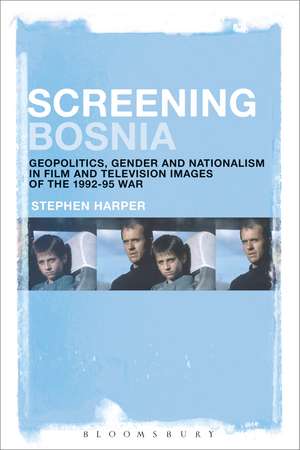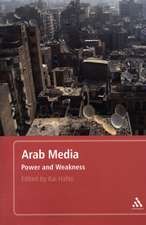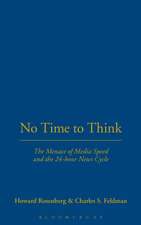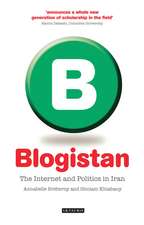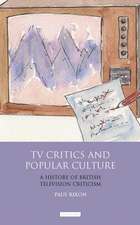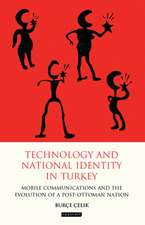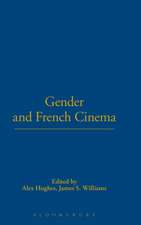Screening Bosnia: Geopolitics, Gender and Nationalism in Film and Television Images of the 1992-95 War
Autor Stephen Harperen Limba Engleză Paperback – 19 sep 2018
| Toate formatele și edițiile | Preț | Express |
|---|---|---|
| Paperback (1) | 235.71 lei 6-8 săpt. | |
| Bloomsbury Publishing – 19 sep 2018 | 235.71 lei 6-8 săpt. | |
| Hardback (1) | 713.29 lei 6-8 săpt. | |
| Bloomsbury Publishing – 8 mar 2017 | 713.29 lei 6-8 săpt. |
Preț: 235.71 lei
Preț vechi: 304.70 lei
-23% Nou
Puncte Express: 354
Preț estimativ în valută:
45.12€ • 49.02$ • 37.92£
45.12€ • 49.02$ • 37.92£
Carte tipărită la comandă
Livrare economică 21 aprilie-05 mai
Preluare comenzi: 021 569.72.76
Specificații
ISBN-13: 9781501346347
ISBN-10: 1501346342
Pagini: 184
Dimensiuni: 152 x 229 x 14 mm
Greutate: 0.26 kg
Ediția:NIPPOD
Editura: Bloomsbury Publishing
Colecția Bloomsbury Academic
Locul publicării:New York, United States
ISBN-10: 1501346342
Pagini: 184
Dimensiuni: 152 x 229 x 14 mm
Greutate: 0.26 kg
Ediția:NIPPOD
Editura: Bloomsbury Publishing
Colecția Bloomsbury Academic
Locul publicării:New York, United States
Caracteristici
Covers contemporary topics: institutional roles of the UN and NATO; representation of rape and genocide
Notă biografică
Stephen Harper is Senior Lecturer in Media Studies at the University of Portsmouth, UK. His previous books include Madness, Power and the Media (2009) and Beyond the Left: The Communist Critique of the Media (2012).
Cuprins
AcknowledgmentsIntroduction1: The Fragmentation of Yugoslavia2: The First Draft of History: (Mis)Reporting the Bosnian War3: Humanitarianism and Its Others: Three 'Liberal' 1990s Bosnian War Dramas4: Going In Hard: Masculinism, Militarism and Melodrama in the Bosnian War Action Film5: The Subject of Rape: Phenomenological and Ideological Representations of Sexual Violence in the Bosnian War Film6: From Nationalism to Normalization: Yugoslav and Post-Yugoslav Films of the Bosnian WarConclusion: Neither Hollywood Nor Belgrade: Towards An Unpatriotic Cinema of the Bosnian WarBibliographyIndex
Recenzii
Harper offers a persuasive and powerful account of the representations of the Bosnian war that tells a wider story about 'oversimplifications of historical reality' in cinematic productions and reveals how strongly geopolitical ideologies can underpin popular culture.
Very well written, engaged and easily readable, this books offers and excellent combination of textual and visual analysis of the Bosnian war movies with general cultural and film theory on the one hand, and on the other hand shows links between media and cinematic production with dominant discourses in international relations and foreign affairs of major geopolitical powers. Relating media representations and geo-politics has been more prominent in scholarship since the 9/11, but applying it - so thoroughly and knowledgeably - to the cinematic production about Bosnian war is a welcome novelty.
Screening Bosnia presents a trenchant analysis of how films and TV dramas have reproduced and endorsed a tendentious ideological version of the Bosnian war. Stephen Harper ably skewers the historical inaccuracies and Balkanist stereotyping employed by liberal filmmakers promoting liberal interventionist fantasies. Not only is this book a brilliant work of film criticism, it also challenges common-sense orthodoxies about past conflicts and current geopolitics.
Stephen Harper's study is a splendid, and long-overdue, survey of films and TV productions made in the aftermath of the Bosnian War of the early-mid 1990s. Appearing some quarter of a century after the war, his book offers a timely and nuanced understanding of this small but brutal conflict and the ways in which it has been represented - and distorted - on the screen. Harper provides the reader with a dispassionate account of the causes and events of the war itself, then meticulously investigates cinematic representations of the conflict produced by many of the parties involved, whether as combatants or peacekeepers. With close readings of a wide range of productions from Hollywood, Pakistan, the UK, and each of the ethnic groupings who participated in the war, Screening Bosnia examines the mediatized portrayal of ethnicity and nationalism, humanitarian interventionism and the dilemmas of peacekeeping, debates surrounding the oftentimes distorted representations of perpetrators and victims, and even the depiction of rape in war. I would warmly recommend this book to anyone with an interest in film and media studies, war studies or European political discourse in the late-twentieth century.
Very well written, engaged and easily readable, this books offers and excellent combination of textual and visual analysis of the Bosnian war movies with general cultural and film theory on the one hand, and on the other hand shows links between media and cinematic production with dominant discourses in international relations and foreign affairs of major geopolitical powers. Relating media representations and geo-politics has been more prominent in scholarship since the 9/11, but applying it - so thoroughly and knowledgeably - to the cinematic production about Bosnian war is a welcome novelty.
Screening Bosnia presents a trenchant analysis of how films and TV dramas have reproduced and endorsed a tendentious ideological version of the Bosnian war. Stephen Harper ably skewers the historical inaccuracies and Balkanist stereotyping employed by liberal filmmakers promoting liberal interventionist fantasies. Not only is this book a brilliant work of film criticism, it also challenges common-sense orthodoxies about past conflicts and current geopolitics.
Stephen Harper's study is a splendid, and long-overdue, survey of films and TV productions made in the aftermath of the Bosnian War of the early-mid 1990s. Appearing some quarter of a century after the war, his book offers a timely and nuanced understanding of this small but brutal conflict and the ways in which it has been represented - and distorted - on the screen. Harper provides the reader with a dispassionate account of the causes and events of the war itself, then meticulously investigates cinematic representations of the conflict produced by many of the parties involved, whether as combatants or peacekeepers. With close readings of a wide range of productions from Hollywood, Pakistan, the UK, and each of the ethnic groupings who participated in the war, Screening Bosnia examines the mediatized portrayal of ethnicity and nationalism, humanitarian interventionism and the dilemmas of peacekeeping, debates surrounding the oftentimes distorted representations of perpetrators and victims, and even the depiction of rape in war. I would warmly recommend this book to anyone with an interest in film and media studies, war studies or European political discourse in the late-twentieth century.
